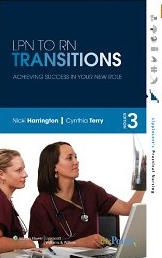|
LPN to RN – Path of AdvancementLPN to RN: whether you're an LPN hoping to become an RN, or a student trying to decide which nursing program is best for you, it's important to consider the possibilities for advancement in your field. Nursing is a vitally important profession, presenting many options in terms of education, work positions, and salary expectations. For an LPN seeking more opportunity to advance in his or her workplace, the LPN to RN program may be the ideal choice. RN and LPN – What's the Difference? RNs and LPNs often work in the same hospitals and medical settings, but they have very different roles in patient care and treatment.
Licensed practical nurses (LPNs) work closely with patients, performing basic care and monitoring vitals and treatment results. They must work under the supervision of a physician, nurse practitioner, and/or RN. Registered nurses (RNs) oversee treatment and patient care, performing the same duties as an LPN if there is no LPN present, but generally with more autonomy. With enough knowledge and training, RNs have the opportunity to advance to positions of authority and receive greater financial compensation through avenues that are not open to even the most experienced and skilled LPNs. According to the Bureau of Labor Statistics, the median salary for an LPN was $39,030 in 2008, while an RN's salary expectations can be much higher, averaging $62,450. LPN to RN Bridge Programs LPNs who want to increase their earning power by becoming an RN usually won’t want to start anew in a nursing program like a 4-year BSN (Bachelor of Science in Nursing) or even a shorter 2-year nursing program. Licensed practical nurses who are already working need a quicker, more efficient way to give their career a boost. To serve this need, many nursing colleges offer "bridge" programs to smooth the transition from LPN to RN. With their knowledge and experience, LPNs can complete one of these bridge programs in a much shorter time frame than a full RN training program. Many of these programs are available online for independent study, which can further minimize study time by letting students set their own pace. For LPNs who are already working in the field and wish to pursue a future career as an RN without leaving their current job, a bridge program is a great way to achieve higher education while still earning money and experience. On the other hand, a bridge program may not be ideal for students currently studying to become an LPN but would like to eventually become an RN. LPN coursework takes 1 to 2 years, and a traditional RN education (outside of a bridge program) can take 2 to 4 years. If your ultimate goal is to work as an RN, it might make more sense for you to simply enter an RN study program at the outset, rather than planning to complete a bridge program while you're just starting out in a new job as an LPN. Students who are visual learners and who do well with independent study tend to excel in LPN to RN bridge programs. Those who thrive on classroom interaction and hands-on training, on the other hand, may be better off in a full-blown RN program. For LPNs who have been working for several years and wish to pursue the advancement opportunities available to RNs, an LPN to RN bridge program can be a great alternative to a 4-year degree program.
An excellent resource on this topic is: LPN to RN Transitions: Achieving Success in Your New Role (Lippincott's Practical Nursing)
Other career path considerations: Return to home page for general information on LPN responsibilities. |




